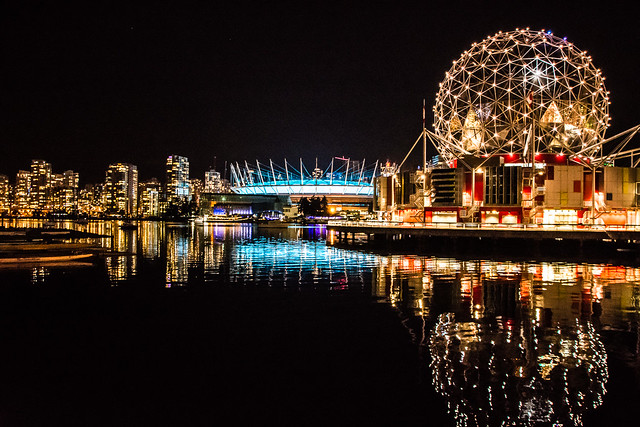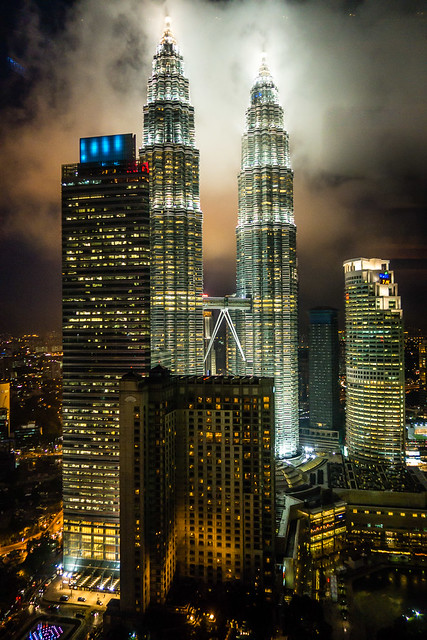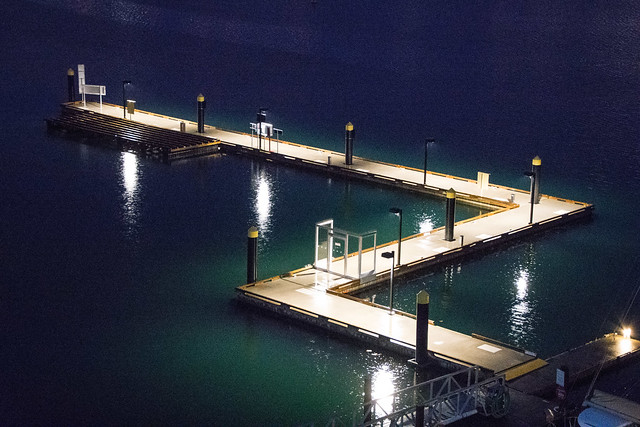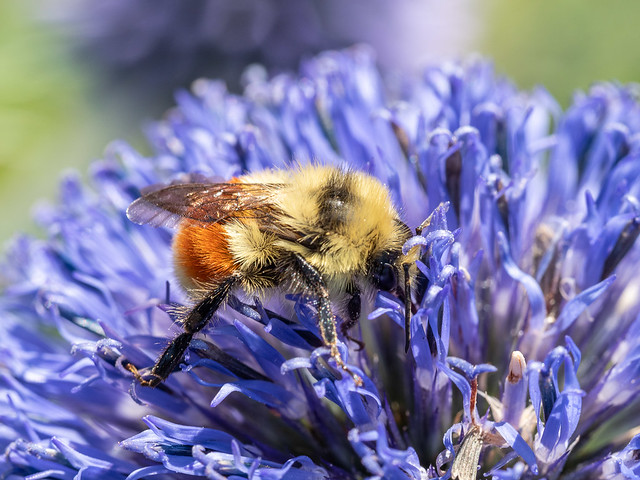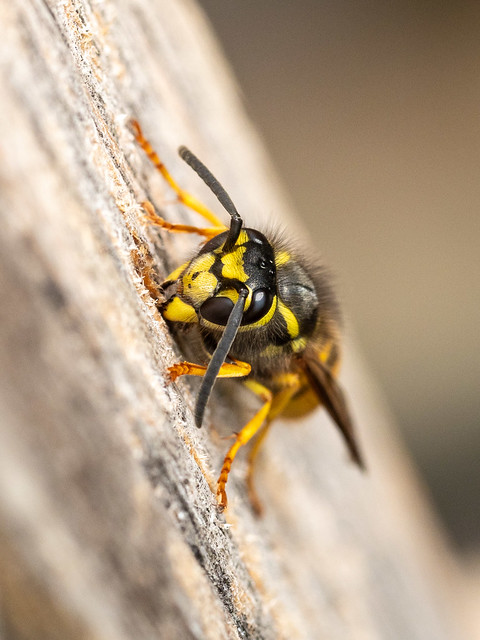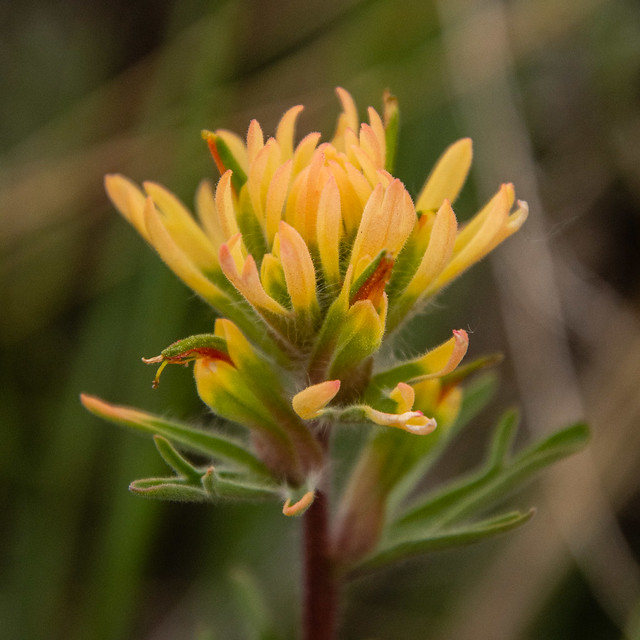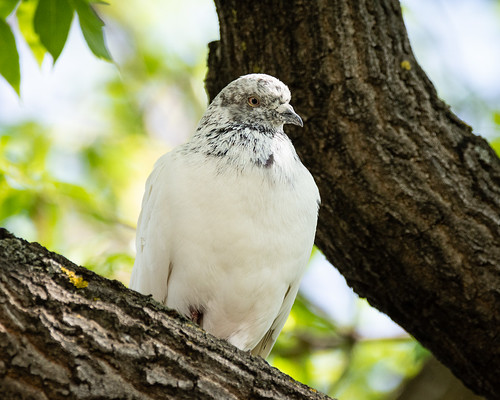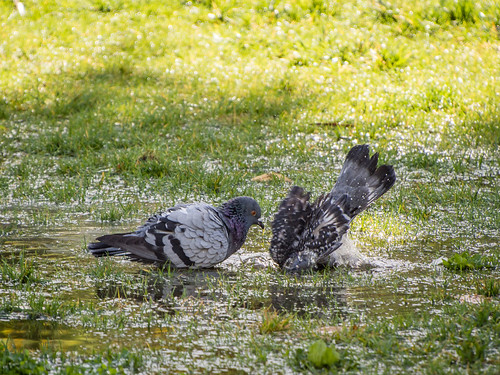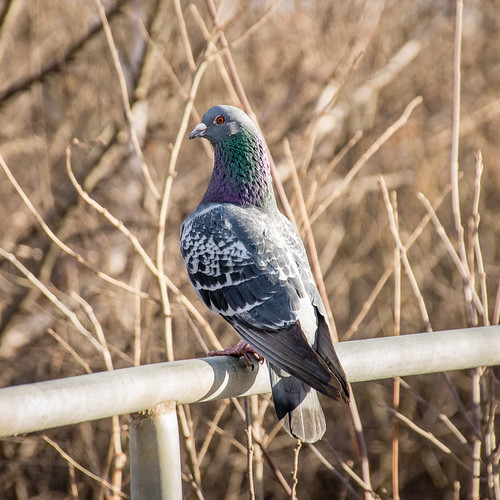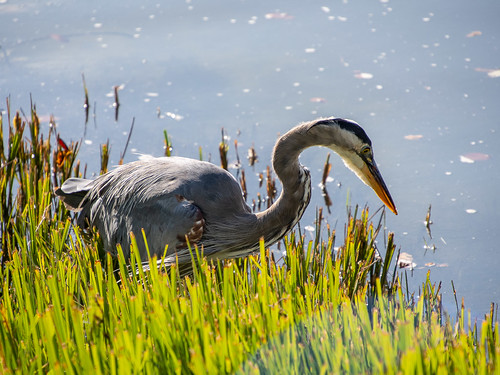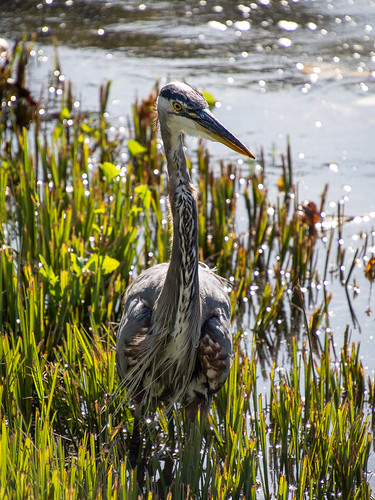Thursday, 29 August 2019
Cities Combatting Light Pollution
If you live in North America, chances are you can’t see the Milky Way. But that’s not the worst impact of light pollution. It’s also affecting our health and the health of plants and wildlife. An earlier article, based on an interview with Rick Huziak, explores light pollution in greater detail. For now, let’s look at what cities (and countries) around the world are doing to combat light pollution.
Tucson/Flagstaff
Tucson and Flagstaff, Arizona, have been attempting to reduce light pollution since 1958. And it’s working. You can see the Milky Way from downtown Flagstaff. Streetlights and parking lot lights must be shielded. They’ve banned upward-facing billboard lighting and restricted the type and amount of light per acre.
“The key factor is getting people passionate about the value of clear night skies, and how light pollution takes them away. To that end, the Flagstaff Dark Skies Coalition hosts annual star parties in the fall and year-round events—art exhibits, lectures, and musical performances—that promote cultural connection to the night sky.”
High Line Park, New York
High Line Park’s designers tried to ensure there was enough lighting to keep pedestrians safe while also ensuring they could still see the night sky. “They chose to use warmer tones in their lighting, and installed the fixtures such that they are hidden, which creates the effect of a pleasant, subtle glow. The lighting is oriented such that it is no higher than waist level, thus reducing glare.”
Mont-Mégantic Dark Sky Reserve, Quebec
The Mont-Mégantic Dark Sky Reserve is centred around the national park and observatory, but it also includes the City of Sherbrooke and 34 other municipalities.
San Francisco
Lights Out, a voluntary program, encourages building owners, managers, and tenants in San Francisco to turn off lights from dusk until dawn during migration season. “This includes internal lighting, external decorative lights and lobby or atrium lights.”
Grenoble
Following community consultation, Grenoble made changes to its street lighting: the lights “are now switched off from 12.30 a.m. to 4.30 a.m. on weekdays and from 2 a.m. to 6 a.m. on Saturday nights/Sunday mornings. Among other planned developments, sensor-controlled lighting is an option being considered in certain neighborhoods.”
Toulouse
Toulouse’s lighting master plan includes test projects involving solar and motion-sensing lighting in pedestrian areas.
Norway
Norway is experimenting with radar-controlled street lights along a stretch of highway. “The radar units . . . detect traffic along the route and its speed. The lights are then increased to full brightness in the path of the vehicle from the default illumination of 20 per cent of full output.”
France
On January 1, 2019, France adopted one of the world’s most progressive light pollution abatement policies. The goal is to establish regulations “to prevent, limit and reduce light pollution, including excessive disturbance to persons, fauna, flora or ecosystems, causing energy wastage or preventing observation of the night sky” and will apply to both public and private lighting. It covers a wide variety of areas including light over waterways, light trespass into private dwellings, and the restriction of blue light.
See Also:
Light Pollution: A Growing Problem
Tuesday, 27 August 2019
EcoSask News, August 27, 2019
Upcoming Events
Eco-Scavenger Hunt, Aug. 31 & Sept. 7 (Saskatoon)
Join Meewasin’s Eco-Scavenger Hunts on Aug. 31 and Sept. 7. Great opportunities to explore the Northeast Swale in the company of experts and try your hand at identifying all the species you discover. The Small Swale isn’t normally open to the public so don’t miss this opportunity on Sept. 7.
Energy Usage & GHG, Sept. 4 (Saskatoon)
Kevin Hudson will discuss energy usage and greenhouse gas emissions at the Sept. 4 breakfast meeting of the SK Energy Management Task Force.
Looking Ahead
Saving the Sage Grouse, Sept. 14 (Val Marie)
Help make the fencing more wildlife-friendly at the Nature Conservancy’s Wideview property from 10 am-3 pm, Sept. 14.
Junior Nature Sketch, Sept. 21-Nov. 2 (Saskatoon)
Junior Nature Sketch, Sept. 21-Nov. 2, is a 6-week program guided by an artist and a naturalist for children ages 5-12.
Adult Nature Sketch, Sept. 21-Nov. 2 (Saskatoon)
Adult Nature Sketch, Sept. 21-Nov. 2, is a 6-week program guided by an artist and a naturalist.
Festival for Future, Sept. 27 (Regina)
Regina Festival for Future is looking for speakers, musicians, artists, poets, and more to participate in the festival from 7-10 pm, Sept. 27.
Nature Retreat, Sept. 27-29 (Ness Creek)
Join SaskOutdoors for a nature retreat at Ness Creek from Sept. 27-29.
Nebo Photography Walk, Sept. 28 (Prince Albert)
Practise your photography at Nature Conservancy’s Nebo property from 10 am-3 pm, Sept. 28.
A full list of upcoming events can be found on the EcoFriendly Sask Calendar
In the News
Waterflooding, a conventional form of oil extraction, could contaminate Saskatchewan’s drinking water. [@BeingGreenSask told us on Twitter, “Stopped recently at #alberta tourism in Lloydminster. Temporary boilwater signs getting old there now. Staff advised not filling our water bottles. Quote: 'This is Husky land'. Yes. Seriously said that.”]
Prairie grasslands – diversity rivalling anything you've ever seen – and all below knee level.
Eleven nature books for children, including one by Saskatchewan’s own Candace Savage.
UK scientists have found that biodiversity, particularly water plants and beetles, is much higher in beaver ponds than in other wetlands in the same region.
The Netherlands’ climate plan is wide-ranging, from overhauling homes to better manure-processing techniques.
Littering the moon's surface are 181,000 kg of forgotten trash. From outer space to the depths of the ocean, “we are garbage.”
Reinventing the small wind turbine could address issues of reliability, embodied energy, and limited power output – and improve public acceptance.
“The ‘war on cars’ is a bad joke. . . . Much of what motorists call a ‘war on cars’ consists of efforts to increase the safety, convenience and comfort of other travel modes.”
The media plays a role in shaping societal attitudes. It’s encouraging to see The Guardian newspaper promoting car-free holidays, such as Leave the car at home, see the UK coast without driving or How to see five UK national parks by public transport.
EcoSask News is a weekly round-up of local news and events. Email us if you have items you would like us to include.
You can follow EcoFriendly Sask by liking us on Facebook, following us on Twitter, or by email (top right corner).
Labels:
Art,
Beavers,
Birds,
Books,
Citizen Science,
Energy,
Government,
Grasslands,
Photography,
Prince Albert,
Regina,
Saskatoon,
Swale,
Transportation,
Val Marie,
Waste,
Water,
Wind
Tuesday, 20 August 2019
EcoSask News, August 20, 2019
Upcoming Events
Avonlea Badlands Tour, Aug. 24 (Moose Jaw)
Members and would-be members of the Moose Jaw Nature Society will be hiking the Avonlea badlands on Aug. 24.
Low Emissions Community, Aug. 26 (Saskatoon)
Join Climate Justice Saskatoon for a discussion about the City’s low emissions plan from 12-1 pm, Aug. 26, in front of City Hall.
Saving Wildflower Seeds, Aug. 28 (Saskatoon)
Renny Grilz, Blazing Star Wildflowers, will share how to find and harvest wildflower seeds from 5:30-7 pm, Aug. 28.
Looking Ahead
Curbside Swap, Sept. 7 (Saskatoon)
Put out swappable items as part of the city-wide Curbside Swap on Sept. 7.
Damsels in Wilderness, Sept. 12-Dec. 12 (Saskatoon)
Young women ages 10-12 who crave more time exploring outdoors and connecting with nature are invited to participate in Damsels in Wilderness, on Thursdays from 4-5:45 pm from Sept. 12 to Dec. 12.
Nature Saskatchewan Fall Meet, Sept. 13-15 (Greenwater)
Nature Saskatchewan is holding its Fall Meet from Sept. 13-15 in Greenwater Lake Provincial Park.
Swap in the Park, Sept. 22 (Saskatoon)
Bring what you want, take what you want at a reduce-reuse-recycle event from 9 am-4 pm, Sept. 22.
Saskatoon Nature Society Field Trips
Golden Eagles
Aug. 29, 8 am – Lakewood & Heritage Parks
Retirees and partners who are interested in birds and the natural world are invited to participate.
Other Saskatoon Nature Society Field Trips
Aug. 24, 8-11 am – Warbler Walk at Forestry Farm
Aug. 31, 8-11 am – Warbler Walk to Green Ash Forest
Everyone is welcome. Check the Saskatoon Nature Society’s website for full details and updated information.
A full list of upcoming events can be found on the EcoFriendly Sask Calendar
In the News
A recent survey shows that Canadians care about climate change, many view it as an urgent emergency, and the majority believe legally-binding emissions targets must play a role in addressing this crisis.
Current global warming can be directly linked to the Industrial Revolution, clearing of forests, population growth, and use of fossil fuels.
The federal government is proposing building conduits from Lake Diefenbaker to Pasqua Lake and the Qu’Appelle Valley to irrigate as much as 100,000 new acres of land.
The Saskatchewan Waste Reduction Council is planning to host a repair café in each Saskatchewan city on Oct. 26. Volunteers are needed who are handy at fixing things.
“There’s a critical need for long-term—years to decades—monitoring for potential contamination of drinking water resources not only from fracking, but also from conventional oil and gas production.”
The “Swiss Army Knife” of New York: A rooftop garden is providing food to residents, shelter for migratory birds, absorbing storm water and air pollution, and lessening noise pollution.
Green chemistry labs teach university students a sustainable and innovative mindset.
A handy guide to some of the most popular Canadian butterflies.
Denmark’s waste-to-energy plant: a global model of sustainable design.
EcoSask News is a weekly round-up of local news and events. Email us if you have items you would like us to include.
You can follow EcoFriendly Sask by liking us on Facebook, following us on Twitter, or by email (top right corner).
Labels:
Advocacy,
Birds,
Butterflies,
Climate Change,
Government,
Green Roofs,
Moose Jaw,
Regina,
Repair,
Saskatoon,
Urban Planning,
Waste,
Water,
Wildflowers,
Youth
Sunday, 18 August 2019
10 Surprising Facts about Pigeons
1. A pigeon saved the lives of 194 American soldiers who were under a constant barrage of both enemy and friendly fire at the end of World War I. The pigeon flew 25 miles to headquarters, even though it had been shot in the chest, blinded by shrapnel, and lost a leg.
2. It’s not only humans and monkeys that can learn abstract mathematical rules. Pigeons learned to peck images on a screen in order, from lower to higher numbers of objects in the group.
3. Pigeons tend to always land on the same foot. A majority land on their right foot first, while a small percentage land on their left foot first (about the same percentage as humans who are left-handed). A very small number of pigeons land on both feet at the same time or alternate.
4. Most birds fill their beaks with water and then tip their heads back to swallow. But not pigeons! They keep their heads down, sucking up the water as if through a straw.
5. Pigeons have extraordinary vision and can distinguish between almost identical shades. They can also track moving stimuli far more closely than humans. A motion picture would look like a slideshow to a pigeon.
6. Homing pigeons regularly fly over 500 miles per day at over 60 miles per hour. They can reach top speed within seconds and one pigeon was recorded flying at 110 miles per hour for several hours.
7. The Maiden Form brassiere company made a vest “to protect carrier pigeons as they parachuted through the air strapped to the chest of paratroopers during World War II. Once the paratroopers hit the ground behind enemy lines, they would release the pigeons so they could fly off to deliver important messages.”
8. Charles Darwin, like many people in Victorian England, bred and raised pigeons. He spent hours reading self-help manuals and chatting with other pigeon breeders.
9. Pigeons with white rump feathers are less likely to be killed by falcons than pigeons with blue rump feathers. The white feathers appear to distract the falcon, causing it to miss its target.
10. In the past, pigeons and doves were seen as one common group of birds. Scientists are now differentiating between the two species. The old name of Rock Dove (or common pigeon) was recently corrected to Rock Pigeon. (with thanks to Stan Shadick, Saskatoon Nature Society, for providing this updated information)
See Also
10 Surprising Facts About Beavers - And Why They Make Great Neighbours
8 Cool Facts About Bats - And What to Do If You Find One In Your Home
Nature Companion, a Comprehensive Nature App for Canada's Four Western Provinces
Tuesday, 13 August 2019
EcoSask News, August 13, 2019
Upcoming Events
Enviro Collective, Aug. 13 (Regina)
Enviro Collective Regina is meeting at 7 pm, Aug. 13.
Learn to Hike, Aug. 14 (Saskatoon)
Outter Limits is hosting a learn to hike info night from 7-8:30 pm, Aug. 14. It’s free but you need to register in advance.
From Seed to Seed, Aug. 16 (Regina)
The film From Seed to Seed about a farming family blending ancient traditions with cutting-edge science will be shown at 7 pm, Aug. 16, as part of the Regina International Film Festival.
Go Science, Aug. 16 (Lipton)
Join the Saskatchewan Science Centre in Lipton for a nature/science program for kids from 1-4 pm, Aug. 16.
Help our Bees, Aug. 18 (Moose Jaw)
Join the Moose Jaw Nature Society to learn about bees and make your own bee bath from 4-6 pm, Aug. 18.
Nature Activity, Aug. 20 (Springside)
Springside Public Library is hosting a special guest from the Yellowhead Flyway Birding Trail Association for a nature activity from 1:30-2:30 pm, Aug. 20.
Singing for a Better World, Aug. 20 (Saskatoon)
Learn some songs about protecting the earth and building peace and justice from 7-9 pm, Aug. 20.
AB Mammal Monitoring, Aug. 20 (webinar)
Find out about wildlife monitoring in Alberta in a noon-hour webinar on Aug. 20 presented by PCAP-SK.
Intro to Permaculture, Aug. 21 (Regina)
Learn about the design principles of permaculture from 7-8:30 pm, Aug. 21, at the Connaught Branch Library.
Hot Composting, Aug. 21 (Saskatoon)
Saskatoon Compost Coaches are offering a hot composting workshop on Aug. 21 from 5:30-7 pm.
Nature Activity, Aug. 22 (Springside)
Springside Public Library is hosting a guest from the Yellowhead Flyway Birding Trail Association from 1:30-2:30 pm, Aug. 22.
Hug a Tree & Survive, Aug. 22 (Prince Albert)
Join Prince Albert North Search and Rescue for a program teaching lost kids how to survive in the woods at 7 pm, Aug. 22.
Family Paddle, Aug. 23 (Regina)
SaskOutdoors is hosting a learn to paddle with kids event from 1-3 pm, Aug. 23. Canoe rental will be provided.
Looking Ahead
Tiny House Workshop, Sept. 20-22 (Regina)
Learn how to build your own tiny house from Sept. 20-22 in Regina.
Permaculture Design Course, Oct.-Apr. (Regina)
Edible Landscapes is offering a permaculture design certificate course over 6 weekends from October to April in Regina. Register in advance and save money.
A full list of upcoming events can be found on the EcoFriendly Sask Calendar
In the News
Fill out a short survey to let Saskatoon's Meewasin Valley Authority know where you would like to see an extension of the trail between the Circle Drive North Bridge and the Chief Mistawasis Bridge.
Banding ruby-throated hummingbirds takes “a delicate touch, infinite patience and steadfast devotion.” Ron Jensen’s “data-gathering is important work, here in the far reaches of the Ruby-throated hummingbirds’ breeding range, where sightings are less common than in places such as Illinois.”
Saskatchewan has a high risk of water shortages. The study reports the main causes as being agricultural (especially raising livestock), wetland drainage, mining, and oil and gas extraction. Residential and industrial water usage is often inefficient, and climate change could bring prolonged hot or dry spells.
“Coexistence implies simply ‘tolerating the other’ whomever or whatever that is. May I suggest that it is time to co-flourish? Time to find solutions and table policy that genuinely embraces and considers the life and happiness of all parties. Every person, creature, habitat and resource holds a necessary vital part in this world. Some may well be way beyond our present understanding.”
San Francisco international airport says “each airport guest creates a half pound of trash. In an effort to reduce the waste, the airport is limiting single-use food accessories such as napkins, coffee cups and chopsticks. In addition to plastic, SFO is banning items with ‘unsubstantiated claims’ about their sustainability.”
Sand “is an essential component of modern life as we know it, yet, strangely enough, we are starting to run out.”
Using electricity at different times of day (load flexibility) “is a win-win-win. It saves money on utilities, it reduces consumer energy bills, and it helps clean up the grid.”
EcoSask News is a weekly round-up of local news and events. Email us if you have items you would like us to include.
You can follow EcoFriendly Sask by liking us on Facebook, following us on Twitter, or by email (top right corner).
Labels:
Advocacy,
Bees,
Birds,
Canoe,
Children,
Composting,
Energy,
Films,
Housing,
Lipton,
Meewasin,
Moose Jaw,
Permaculture,
Prince Albert,
Regina,
Saskatoon,
Springside,
Waste,
Water,
Wildlife
Wednesday, 7 August 2019
Seeds of Change: Farming & the Natural Environment
Spring water, edible weeds, compost and manure – the 12-13 year olds attending CISV Saskatoon’s summer camp excursion to a farm in the aspen parkland had lots to learn about the natural environment of Saskatchewan and the role and impact of agriculture and farming.
Here’s what some of the youth participants had to say:
“I had fun. I liked the compost pile. I learned that farming is a difficult life. There are a lot of jobs with not a lot of help. It’s hard being farmer because there are big companies that make the prices fall. It’s better to support small companies that care about what they do. They care about the soil. It’s important not to support companies that don’t have good ethics.” - Carlos
“I learned that there is not enough wetlands in the world and we need more wetlands. The changing environment has destroyed them, such as things like pollution and building houses on the land, means that we are losing the wetlands that animals live in, and that means that we are losing the animals too.” - Ben
“I learned a lot at the garden, such as you have to take a lot of care of what you want to grow and that sometimes it seems like it is boring but at the end you discover that it is a very fun thing and you can do it happily.” - Martin
“Some weeds are very bad because they are invasive. It was really hard to pull the burdock out of the ground, and it is not good how it takes over. It will be everywhere and it will cause the natural plants to disappear.” - Soren
CISV Saskatoon received an EcoFriendly Action Grant to help pay the costs of the outing.
You can follow EcoFriendly Sask by liking us on Facebook, following us on Twitter, or by email (top right corner).
A full list of upcoming events can be found on the EcoFriendly Sask Calendar
Tuesday, 6 August 2019
EcoSask News, August 6, 2019
Upcoming Events
Household Hazardous Waste, Aug. 11 (Saskatoon)
You can dispose of household hazardous waste at City of Saskatoon’s Civic Operations Centre from 9 am – 3:30 pm, Aug. 11.
Fabulous Feathered Fun, Aug. 12 (Prince Albert)
Visit the John M. Cuelenaere Public Library for stories, rhymes, and craft featuring our feathered friends at 2 pm, Aug. 12.
Permaculture Garden Tour, Aug. 13 (Saskatoon)
Join Permaculture Saskatchewan for a garden tour and potluck at 6 pm, Aug. 13.
Prairie Bats & White Nose Syndrome, Aug. 14 (Eastend)
There will be a discussion on white nose syndrome on the Canadian Prairies at SODCAP’s AGM at 1 pm, Aug. 14.
Owls on the Prowl, Aug. 14 (Gravelbourg)
Kids can meet a burrowing owl from 3-4 pm, Aug. 14, at Gravelbourg Public Library.
Nature Activity, Aug. 14 (Churchbridge)
Churchbridge Public Library is hosting a special guest from the Yellowhead Flyway Birding Trail Association for a nature activity from 2-3 pm, Aug. 14.
Meditations on the Prairie, Aug. 14-Sept. 13 (Saskatoon)
John Penner’s photographs of the Canadian prairie landscape will be on display in The Gallery of the Frances Morrison Library from Aug. 14-Sept. 13.
Looking Ahead
Meewasin Eco-Scavenger Hunts, Aug. 17, 24, 31 & Sept. 7 (Saskatoon)
Help document active species in the Small and Northeast Swales, Aug. 17 (9 am-4 pm), Aug. 24 (9 am-4 pm), Aug. 31 (8-10 am), and Sept. 7 (9 am-4 pm). People of all experiences and backgrounds are welcome to join.
Wascana Junior Naturalist, Sept-Nov (Regina)
Kids ages 9-13 can participate in a variety of activities at Wascana Junior Naturalist from 6-8 pm on Sept. 10 & 17, Oct. 1, 22 & 29, and Nov. 19 & 26.
Forest Gardening North of the 29th, Sept. 13-15 (Ness Creek)
Richard Walker will share the key skills of forest gardening from Sept. 13-15 at Ness Creek.
A full list of upcoming events can be found on the EcoFriendly Sask Calendar
In the News
Friends of Wascana Marsh is looking for volunteers to help with pond dipping and marsh hikes during the Harbour Landing Summer Bash from 10 am-6 pm, Aug. 25. Call Ramona at 306.531.9759 if you can help.
Saskatoon residents are encouraged to contact their City Councillor and to show your support for the City’s proposed Low Emissions Community Plan.
Conservation groups in Minnesota are urged to address unregulated agricultural sub-surface drainage tiling. Tiling drains fields rapidly and can lead to loss of wetland wildlife and plants, water pollution, and downstream flooding. A strong response to the article provides additional information both pro and con.
“The current carbon footprint of the fashion industry is over eight per cent of total global greenhouse gas emissions, larger than all international travel. . . . The average consumer bought 60 per cent more clothing in 2014 than in 2000, but kept each garment half as long. . . . and less than one per cent of all clothing produced globally is recycled.”
“There is no evidence that fracking can operate without threatening public health directly and without imperiling climate stability upon which public health depends.”
Energy development and commercial interests win when pitted against endangered species.
Wales’ Wildlife Trust has developed a short film based on Wind in the Willows to shed light on the problems faced by wildlife today. What if we developed a similar film for Saskatchewan based on Who Has Seen the Wind or Wolf Willow?
EcoSask News is a weekly round-up of local news and events. Email us if you have items you would like us to include.
You can follow EcoFriendly Sask by liking us on Facebook, following us on Twitter, or by email (top right corner).
Labels:
Agriculture,
Bats,
Children,
Churchbridge,
Clothes,
Eastend,
Gravelbourg,
Meewasin,
Owls,
Permaculture,
Photography,
Prince Albert,
Regina,
Saskatoon,
Volunteers,
Wascana,
Waste,
Wildlife
Thursday, 1 August 2019
What a Mess! Thank You for Cleaning it Up
 |
| Hudson Bay Park/Mayfair/Kelsey Woodlawn Community Association |
Plastic – it’s polluting our land and oceans, killing fish, birds, and wildlife and even showing up in our food. But the most common form of pollution is one you may not have even considered. Approximately 4.5 trillion cigarette butts are discarded every year and they’re deadly.
The filters are made of plastic that will never break down entirely. They “are laced with chemicals including arsenic and heavy metals which can end up in the water supply, and is dangerous to animals, marine life and anyone who ingests them.” (1) They’re often mistaken for food by fish, dolphins, birds, and other sea turtles, showing up in the stomach of dead or dying sea creatures.
The damage cigarette butts cause doesn’t stop there. Recent studies have shown that the chemicals used to make the filters more flexible reduce the germination rate and growth of plants. (2)
The next most common forms of waste are plastic-lined coffee cups, plastic bottles, and food wrappers (chip bags, chocolate bar wrappers, etc.).
The top 5 plastic polluters in Canada in 2018 were Nestlé, Tim Hortons, PepsiCo., The Coca-Cola Company, and McDonald’s Corporation. “Their brands’ contribution to plastic pollution is alarming, but unsurprising given the billions of single-use plastic packaged products they churn out yearly. Pop and water bottles, rogue bottle caps, Lay’s chip bags, Kit Kat and Coffee Crisp bar wrappers; chances are that any cleanup conducted will reveal plastic pollution associated with these companies.” (3)
 |
| Natural Resource Technologies students |
EcoFriendly Sask provides annual clean-up grants of $500 to those groups who are prepared to get out there and clean up the mess. 13 organizations across Saskatchewan received grants in 2019. They ranged from student groups in Preeceville, Prince Albert, and Saskatoon to community organizations in Denare Beach, Lampman, and Martensville.
The Denare Beach New Horizon’s Club used a canoe to pick garbage out of the water near the shore.
65 volunteers from the Hudson Bay Park/Mayfair/Kelsey Woodlawn Community Association collected 1,840 kilos of waste, including 20 tires, 2 pails of hazardous waste, and a large amount of batteries.
Club Joy in Martensville was pleased to be able to clean up the park and pond for the ducks and inspired others in the park area to help them.
Students in the Natural Resource Technologies program at Saskatchewan Polytechnic, Prince Albert, cleaned a 4 km stretch of Highway 55. Vehicles honked their horns to show support and the students hoped that their efforts would have a positive impact on the children riding the many school buses passing by.
Centennial Collegiate’s Outdoor Club held two clean-up events – at Saskatoon’s Northeast Swale and in Greenwater Provincial Park.
Saskatoon Search and Rescue spotted beavers as they cleaned up along the Meewasin trail.
 |
| Saskatoon Search and Rescue |
(1) https://usmc-mccs.org/articles/the-most-common-type-of-litter-in-the-world/
(2) https://www.independent.co.uk/environment/cigarette-butt-filter-environmental-damage-plant-growth-study-a9011616.html
(3) https://www.greenpeace.org/canada/en/story/5346/and-the-top-5-plastic-polluters-are/
Subscribe to:
Posts (Atom)
